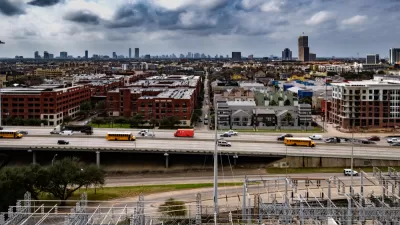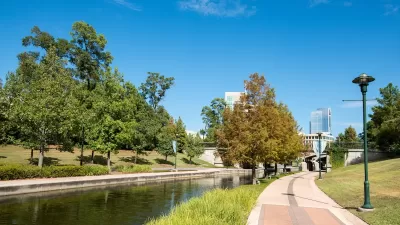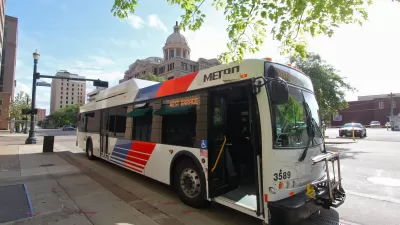Lots of dollar signs were flying around on Texas ballots last week, many of which were headed toward road construction measures. The Houston Chronicle, however, points out the shortcomings of the state's patterns of investment.
Dug Begley provides less-than-complimentary commentary on the suite of transportation funding measures on the ballot last week in Texas.
"By huge margins," reports Begley to open the article, "voters Tuesday seized on every opportunity they had to give local and state officials authority to fix ailing highways and county roads. These results, many said, reflect frustration with congestion and a willingness to authorize spending for transportation projects – as long as they don’t directly take more money from voters' pockets."
Voters in Harris and Montgomery counties approved massive road bond measures, of $700 million and $280 million, respectively. Bonds mean borrowing, as Begley points out. "Moreover, the spending is narrowly focused on roads rather than other transportation improvements. Tollways and transit projects were excluded, leaving advocates of public transit and compact development frustrated," adds Begley.
The problem at the state level, according to Begley, is that in its rush to prevent any new taxes, Texas is playing a shell game: "Prop. 7, which passed with more than 80 percent of the vote, moves sales tax money to transportation. That ultimately leaves state legislators less to spend on other government functions."
The article goes on to describe in some detail the current political climate surrounding questions of transportation spending. While car-centric investments are the status quo, public transit has made small gains, with sometimes mixed reviews. Begley closes by noting that officials in the Houston area have already planned for the funding Prop 7 will bring, "[b]ut only time will tell how long those solutions will last before voters demand another round of relief, and whether that set of solutions look a lot like the past ones."
FULL STORY: Road spending popular, but effects can be fleeting

Alabama: Trump Terminates Settlements for Black Communities Harmed By Raw Sewage
Trump deemed the landmark civil rights agreement “illegal DEI and environmental justice policy.”

Study: Maui’s Plan to Convert Vacation Rentals to Long-Term Housing Could Cause Nearly $1 Billion Economic Loss
The plan would reduce visitor accommodation by 25% resulting in 1,900 jobs lost.

Why Should We Subsidize Public Transportation?
Many public transit agencies face financial stress due to rising costs, declining fare revenue, and declining subsidies. Transit advocates must provide a strong business case for increasing public transit funding.

Paris Bike Boom Leads to Steep Drop in Air Pollution
The French city’s air quality has improved dramatically in the past 20 years, coinciding with a growth in cycling.

Why Housing Costs More to Build in California Than in Texas
Hard costs like labor and materials combined with ‘soft’ costs such as permitting make building in the San Francisco Bay Area almost three times as costly as in Texas cities.

San Diego County Sees a Rise in Urban Coyotes
San Diego County experiences a rise in urban coyotes, as sightings become prevalent throughout its urban neighbourhoods and surrounding areas.
Urban Design for Planners 1: Software Tools
This six-course series explores essential urban design concepts using open source software and equips planners with the tools they need to participate fully in the urban design process.
Planning for Universal Design
Learn the tools for implementing Universal Design in planning regulations.
Smith Gee Studio
Alamo Area Metropolitan Planning Organization
City of Santa Clarita
Institute for Housing and Urban Development Studies (IHS)
City of Grandview
Harvard GSD Executive Education
Toledo-Lucas County Plan Commissions
Salt Lake City
NYU Wagner Graduate School of Public Service





























